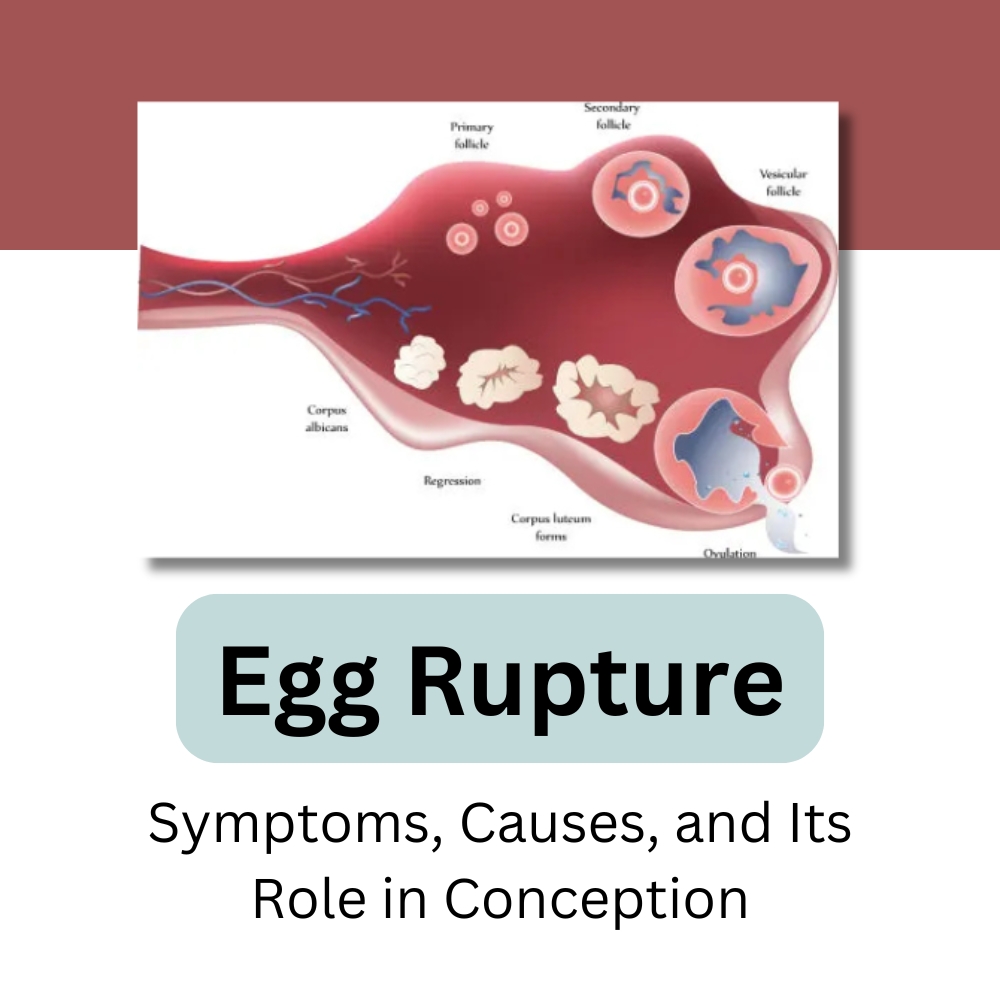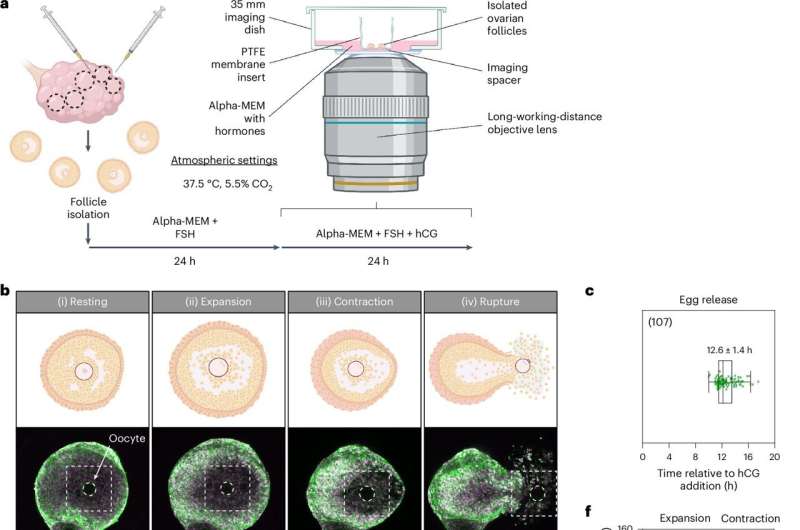Egg rupture, also known as ovulation, is a critical part of the female reproductive process.
It plays a pivotal role in conception, making it a topic of significant interest for women trying to conceive.
Understanding the symptoms, causes, and implications of egg rupture can empower individuals with the knowledge needed to plan their pregnancies effectively.

What is Egg Rupture?
Egg rupture refers to the release of a mature egg from the ovary into the fallopian tube during the menstrual cycle.
This process typically occurs around the 14th day of a 28-day cycle but can vary depending on individual cycles.
The egg remains viable for fertilization for up to 24 hours after its release, making this a crucial window for conception.
Symptoms of Egg Rupture
While not all women experience noticeable symptoms, some common signs of egg rupture include:
- Mittelschmerz (Ovulation Pain): Mild to sharp abdominal pain, sometimes on one side, is a common indicator of follicle rupture.
- Changes in Cervical Mucus: Cervical mucus becomes clear, slippery, and stretchy, resembling egg whites.
- Symptoms of Egg Rupture After HCG Injection: HCG injections are used to trigger ovulation. Post-injection, women may experience cramping, abdominal discomfort, or light spotting, indicating follicle rupture.
- Increased Basal Body Temperature (BBT): A rise in BBT typically follows ovulation.
- Pain When Egg Meets Sperm: Some women report mild cramping or twinges when fertilization occurs, though this is not universally experienced.
Causes and Triggers of Egg Rupture
Egg rupture is regulated by a surge in luteinizing hormone (LH), which occurs mid-cycle. However, several factors can influence ovulation, including:
- Hormonal Imbalances: Conditions like polycystic ovary syndrome (PCOS) or thyroid disorders can disrupt ovulation.
- Stress: High stress levels can alter the hormonal balance necessary for egg rupture.
- Lifestyle Factors: Poor diet, excessive exercise, or being under/overweight can affect ovulation.
- Age: Fertility declines with age, especially after the mid-30s, affecting regular ovulation.
After HCG Injection: When Does Egg Rupture?
Following an HCG injection, the egg usually ruptures within 36-48 hours.
This timing is crucial for couples trying to conceive, as it helps plan intercourse to maximize the chances of pregnancy after egg rupture.
Egg Rupture But Not Conceived: Why?
Even with successful egg rupture, conception may not occur due to:
- Poor sperm quality or low sperm count.
- Timing of intercourse not aligning with ovulation.
- Issues with egg quality or health.
- Blockages in the fallopian tubes preventing sperm from meeting the egg.
After Rupture of Egg: When to Have Intercourse?
The best time to have intercourse is within 12-24 hours after egg rupture, as this is when the egg is most viable.
To further improve chances, starting intercourse a day or two before ovulation ensures sperm is already present when the egg is released.
What Happens to the Ruptured Follicle After Ovulation?
After ovulation, the ruptured follicle becomes the corpus luteum. This structure secretes progesterone to prepare the uterus for implantation.
If fertilization does not occur, the corpus luteum breaks down, leading to menstruation.
Symptoms When Sperm Meets Egg
When sperm meets egg, some women may notice early pregnancy symptoms like:
- Mild cramping or twinges in the lower abdomen.
- Increased cervical mucus.
- Tender breasts or slight bloating.
Symptoms of Pregnancy After Egg Rupture
Early pregnancy signs can include:
- Implantation bleeding (light spotting 6-12 days after ovulation).
- Fatigue and mood changes due to rising hormone levels.
- Nausea or food aversions.
Chances of Pregnancy After Egg Rupture
The chances of conception after egg rupture depend on several factors, such as the timing of intercourse, egg quality, and sperm health.
With perfectly timed intercourse, the chances of pregnancy can be as high as 20-25% per cycle for healthy couples.
Ruptured Follicle Means Pregnant?
While a ruptured follicle indicates ovulation, it doesn’t guarantee pregnancy. Fertilization and implantation must occur for pregnancy to begin.
The Role of Egg Rupture in Conception
Egg rupture is fundamental for natural conception. When the egg is released, it travels through the fallopian tube, where it can meet sperm for fertilization.
For couples trying to conceive, timing intercourse around ovulation maximizes the chances of pregnancy.
Monitoring ovulation through methods like ovulation predictor kits, BBT tracking, and observing cervical mucus changes can help identify the fertile window.
Breakthrough Insights: Imaging Ovulation and Egg Rupture in Action

Recent advancements in imaging technology have provided groundbreaking insights into the process of ovulation, offering a deeper understanding of egg rupture and its role in conception.
According to a study published on Phys.org, researchers have captured ovulation in real-time, highlighting the intricate mechanics involved when the follicle releases an egg.
This imaging revealed that the rupture process is distinct and influenced by various biological factors, such as follicular size and hormone activity.
These findings shed light on why conception may not always occur despite successful egg rupture, offering hope for improved fertility treatments.
When to Seek Medical Advice?
If ovulation is irregular or absent (anovulation), it may lead to difficulties in conceiving.
Women experiencing such issues should seek professional medical advice to determine the underlying causes and explore treatment options.
About Dr. Aprajita Srivastava and Qure Clinic
Dr. Aprajita Srivastava is a renowned gynecologist and fertility expert, known for her compassionate care and evidence-based approach.
With years of experience, she specializes in diagnosing and treating ovulation-related disorders, guiding countless women on their journey to motherhood.
At Qure Clinic, we are committed to providing personalized care for all your fertility and gynecological needs.
From advanced diagnostic tools to tailored treatment plans, Qure Clinic ensures every patient receives world-class medical care in a supportive environment.
For expert advice on egg rupture and fertility concerns, including Infertility Treatment In Noida, book your appointment with Dr. Aprajita Srivastava at Qure Clinic today.
Empower your journey to parenthood with professional guidance you can trust!
FAQs About Egg Rupture and Conception
Yes, pregnancy is possible after egg rupture. When sperm meets the egg within 12-24 hours of ovulation, fertilization can occur.
Timing intercourse during this fertile window significantly increases the chances of pregnancy after egg rupture.
Eggs survive for about 12-24 hours after rupture. To maximize the chances of pregnancy, it’s important to have intercourse either a day before or shortly after egg rupture, as the egg’s viability is limited.
Some women feel mild abdominal pain, called Mittelschmerz, during egg rupture. This pain is caused by the follicle releasing the egg.
It’s normal and usually subsides within a few hours.
No, pregnancy is not possible without egg rupture. Ovulation, which involves the egg’s release from the follicle, is necessary for fertilization.
If egg rupture does not occur, conception cannot take place.
A mature follicle usually reaches a size of 18-24 mm before releasing an egg.
Monitoring follicle size with ultrasounds can help predict ovulation and ensure the timing of intercourse aligns with egg rupture.
A pregnancy test should be taken 10-14 days after egg rupture.
This allows time for fertilization, implantation, and the rise of HCG levels, which can confirm pregnancy symptoms after egg rupture.
Pregnancy typically occurs within 24 hours after egg rupture if sperm is present. Fertilization happens when sperm meets the egg during this time.
Intercourse before and after ovulation increases the chances of conception.
Dr. Aprajita Srivastava is a highly experienced IVF Specialist in Noida, Gynecologist, and Obstetrician with over 13 years of expertise. Holding an MBBS, DGO, and a Fellowship in Minimal Access Gynaecology Surgery & Reproductive Medicine, she specializes in IVF, IUI, and advanced fertility treatments.
Practicing at Qure Clinic, Sector 121, Noida, Dr. Aprajita is dedicated to compassionate care, personalized solutions, and helping families achieve their dream of parenthood.
